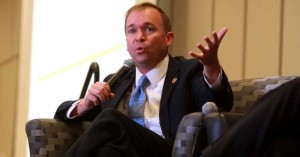Before leaving the Consumer Financial Protection Bureau Friday, Richard Cordray added one final twist in an effort to slow attempts to reel in the agency’s authority.
Cordray appointed CFPB Chief of Staff Leandra English as deputy director, which under the Dodd-Frank Act could potentially catapult English to acting director until the Trump administration can appoint a permanent replacement.
At the same time, President Donald Trump named Mick Mulvaney, head of the Office of Management and Budget, to serve as acting director, citing his power under the Federal Vacancies Reform Act.
English then sued Trump and Mulvaney on Sunday and asked the courts to put her in charge of the agency.
CFPB General Counsel Mary McLeod in a memo first obtained by Politico sided with Trump, asserting the president does have the power to appoint an acting director.
“I advise all bureau personnel to act consistently with the understanding that Director Mulvaney is the acting director of the CFPB,” she wrote in the memo.
The complication is due to varying language in the Dodd-Frank and FVRA, which differ on who has the power to name an acting director.
According to the Dodd-Frank Act, which created the CFPB, the CFPB deputy director, which English became on Nov. 24, may serve as the bureau’s acting director in the absence or unavailability of the director.
However, the FVRA states the president has the authority to appoint an acting director to a federal agency in the absence of a permanent director.
The wording can be interpreted differently, but McLeod in her memo said she believes precedent overrules wording in this case.
“In the present circumstances, it is not necessary to resolve the meaning of ‘absence or unavailability’ because the statutory language, legislative history, precedent from the Office of Legal Counsel at the Department of Justice, and case law all point to the conclusion that the president may use the Vacancies Reform Act to designate an acting official, even when there is a succession statute under which another official may serve as acting,” she said.
The CFPB was created to combat predatory lending practices that helped spark the financial crisis, among a number of other reasons that involved protecting consumers and educating them further so they could make more informed financial decisions.
The agency has returned almost $12 billion to 30 million consumers in its six years of existence.
But along the way, the agency has made its fair share of enemies, who argue the CFPB has overreached and developed policies that are detrimental to smaller institutions. Lawmakers have filed bills currently pending to greatly reduce the CFPB’s power.
The lawsuit is perhaps an indication of the larger battle to come between the CFPB and Trump administration over the agency’s regulatory stance toward financial institutions.




 |
| 


